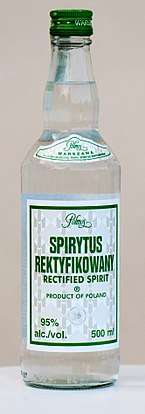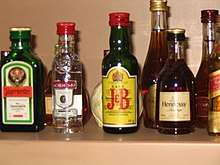Rectified spirit

Rectified spirit, also known as neutral spirits, rectified alcohol, or ethyl alcohol of agricultural origin[1] is highly concentrated ethanol which has been purified by means of repeated distillation, a process that is called rectification. In some countries (e.g. India), denatured alcohol or denatured rectified spirit may commonly be available as "rectified spirit", but it is poisonous and ingestion can be fatal.
In its undiluted form, it contains at least 95% alcohol by volume (ABV) (190 US proof) in the United States, or at least 96% ABV in the European Union.[1] The purity of rectified spirit has a practical limit of 97.2% ABV (95.6% by mass)[2] when produced using conventional distillation processes, because a mixture of ethanol and water becomes a minimum-boiling azeotrope at this concentration. Rectified spirit is typically distilled in continuous multi-column stills at 96–96.5% ABV, and diluted as necessary.
Neutral spirits can be produced from grain, corn, grapes, sugar beets, sugarcane, tuber, or other fermented plant material. In particular, large quantities of neutral alcohol are distilled from wine. Such a product made from grain is "grain neutral spirit", while such a spirit made from grapes is called "grape neutral spirit",[3] or "vinous alcohol".[4]
Neutral spirits are used in the production of blended whisky, cut brandy, some liqueurs, and some bitters. As a consumer product, it is almost always mixed with other beverages to create such drinks as punch, or is sometimes added to cocktails in place of vodka or rum and is used in Jello shots.[5] It is also used to make homemade liqueurs, such as limoncello or cassis, and in cooking because its high concentration of alcohol acts as a solvent to extract flavors.[6] Rectified spirits are also used for medicinal tinctures, and as a household solvent. It is sometimes drunk undiluted; however as the alcohol is very high-proof, overconsumption can cause alcohol poisoning more quickly than with more traditional distilled spirits.[7]
Regional
United States
Neutral spirit is legally defined as spirit distilled from any material distilled at or above 95% ABV (190 US proof) and bottled at or above 40% ABV.[3] When the term is used in an informal context rather than as a term of U.S. law, any distilled spirit of high alcohol purity (e.g., 170 proof or higher) that does not contain added flavoring may be referred to as neutral alcohol.[8] Prominent brands of neutral spirits sold in the US:
"Grain spirits" is a legal classification for neutral spirit that is distilled from fermented grain mash and stored in oak containers.[3]
Retail availability
Availability of neutral spirit for retail purchase varies between states. States where consumer sales of high-ABV neutral spirit are prohibited include Florida,[10] Maine, Minnesota,[11] Nevada,[12] North Carolina,[13] Ohio, Pennsylvania,[14] Iowa, and West Virginia.[14] In Virginia, the purchase of neutral spirits requires a no-cost "Grain Alcohol Permit", issued "strictly for industrial, commercial, culinary or medicinal use".[15] In 2017 Virginia approved the sale of up to 151 proof neutral spirits at its ABC stores without a permit.[16] Pennsylvania sells 151 proof without a permit, but requires one for 190 proof.[17]
Germany
In German, rectified spirit is generically called Primasprit (colloquial) or, more technically, Neutralalkohol. It is available in pharmacies, bigger supermarkets, or East-European markets. In the former East Germany, it was available in regular stores.
In Germany, Primasprit is most often used for making homemade liqueurs; other types of use are rare. Most of the Primasprit produced in Germany is made from grain and is, therefore, a neutral grain spirit.
Norway
The import[18] and sale[19] of spirits containing more than 60% alcohol by volume is prohibited, so only weaker grain spirits are permitted.
See also
References
- 1 2 E.U. Definitions of Categories of Spirit Drinks 110/2008, M(b), 2008
- ↑ Inge Russell, ed. (2003). Whisky: Technology, Production and Marketing. Graham Stewart. Academic Press. p. 180.
- 1 2 3 27 C.F.R. 5.22(a) Class 1
- ↑ Results of sales of vinous alcohol held by public agencies
- ↑ "Drink Recipe Browser: Everclear drinks". Drinknation. 2010. Retrieved 17 November 2010.
- ↑ Walton, Stuart; Norma Miller (2000). An Encyclopedia of Spirits & Liqueurs and How to Cook with Them. London: Hermes House. ISBN 1-84215-154-1.
- ↑ Sonja Sharp; Kenneth Lovett (2010). "That's the spirit! State approves 192-proof Spirytus, allowing New Yorkers to get quite the buzz". The Daily News.
- ↑ Lichine, Alexis. Alexis Lichine's New Encyclopedia of Wines & Spirits (New York: Alfred A. Knopf, 1987), 365.
- ↑ "Neutral Spirits". Luxco official website. Retrieved November 9, 2017.
- ↑ 2009 Florida Statutes, Title XXXIV
- ↑ "2017 Minnesota Statutes: 34A.506 Sales of ethyl alcohol and neutral spirits prohibited". Office of the Revisor of Statutes. Minnesota Legislature. Retrieved November 9, 2017.
- ↑ "Chapter 202 – Crimes against public health and safety – NRS 202.065 Sale of alcoholic beverage containing more than 80 percent of alcohol by volume". Nevada Legislature. Retrieved November 9, 2017.
- ↑ ABC Commission to end sales of 190-proof booze | Cape Fear Watchdogs
- 1 2 "Senate Passes Ban Of 190-Proof Alcohol Products". CBS News. Associated Press. February 5, 2014. Retrieved November 9, 2017.
- ↑ Virginia Department of Alcoholic Beverage Control "Permits"
- ↑ http://wtop.com/virginia/2017/03/everclear-to-be-legal-in-virginia/
- ↑ http://www.lcbapps.lcb.state.pa.us/webapp/Product_Management/psi_ProductLocation_inter.asp?cdeNo=8357
- ↑ . Directorate of Norwegian Customs https://www.toll.no/en/goods/alcohol-and-tobacco/quotas/. Retrieved 26 August 2017. Missing or empty
|title=(help) - ↑ "Lovdata (in Norwegian)". Retrieved 26 August 2017.


